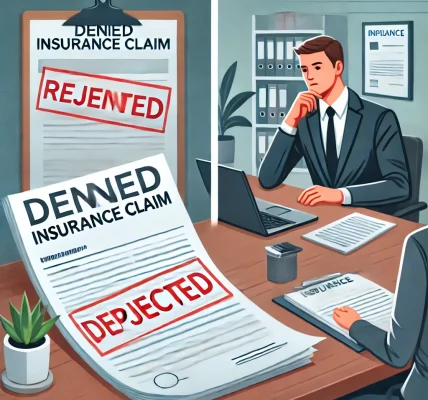Filing an insurance claim can be a stressful process, and making mistakes can lead to delays, reduced payouts, or even denial of your claim. Whether you are filing a claim for health, auto, home, or life insurance, being aware of common pitfalls can help you navigate the process smoothly. In this guide, we will highlight the most frequent mistakes claimants make and provide practical advice on how to avoid them.
1. Delaying the Claim Process
One of the most common mistakes people make is waiting too long to file a claim. Most insurance policies have strict deadlines for claim submission. If you delay reporting an incident, you may face challenges such as:
- Missed deadlines leading to automatic claim denial.
- Difficulties in collecting evidence since proof of damage may no longer be available.
- Longer processing times as the insurer might require additional verification.
Solution: Always report an incident as soon as possible. Check your policy for the exact timeline to file a claim and initiate the process without delay.
2. Providing Incomplete or Incorrect Information
Submitting inaccurate details—whether intentional or unintentional—can lead to delays or even rejection of your claim. Common issues include:
- Providing incorrect dates or locations.
- Exaggerating damages or losses.
- Missing crucial details about the incident.
Solution: Always provide honest and accurate information. Double-check your claim form before submission to ensure all details are correct and well-documented.
3. Not Understanding Your Policy Coverage
Many people assume their policy covers everything, only to find out later that their claim falls outside of the coverage scope. This can lead to unnecessary frustration and disputes.
Solution: Before filing a claim, thoroughly review your policy to understand:
- What is covered and what is excluded.
- The claim limits and deductibles.
- Any conditions or clauses that may affect the approval process.
If you are unsure about any terms, contact your insurance provider for clarification.
4. Failing to Gather Sufficient Evidence
Insurance companies require proof to validate your claim. Failing to provide strong evidence can result in delays or claim denial.
Solution: Ensure you have:
- Photographs and videos of the damage or accident scene.
- Receipts and invoices for damaged or stolen items.
- Medical records and bills (for health insurance claims).
- Police reports (if applicable, such as in theft or accident cases).
5. Not Keeping Copies of Submitted Documents
Many claimants submit original documents and do not keep a copy for their records. If the insurer misplaces a document or requests additional copies, you may struggle to provide the required paperwork.
Solution: Always keep copies of all forms, receipts, and communication related to your claim. You can store these physically or digitally for easy access.
6. Accepting a Low Settlement Without Reviewing It
Some insurance companies may offer a quick settlement that is lower than what you are entitled to. Many policyholders accept it without question due to urgency or lack of knowledge.
Solution: Before accepting a settlement:
- Compare the offer with your policy coverage.
- Consult an independent appraiser if needed.
- Negotiate if you feel the offer is unfair.
If necessary, you can appeal the decision with additional evidence to support your claim.
7. Overlooking the Role of Deductibles
A deductible is the amount you must pay out of pocket before your insurance coverage applies. Some claimants forget this and expect full compensation, leading to disappointment.
Solution: Understand your deductible and factor it into your claim calculations. If your loss is smaller than your deductible, filing a claim may not be beneficial.
8. Ignoring Communication from the Insurer
Failing to respond to calls, emails, or document requests from your insurance company can slow down the process or lead to claim denial.
Solution: Always be responsive and proactive in communicating with your insurer. If they request additional information, provide it promptly to avoid unnecessary delays.
9. Not Seeking Professional Help When Needed
For complex claims, such as major property damage or high medical bills, some claimants try to handle everything on their own, leading to mistakes.
Solution: If you are struggling with a claim, consider consulting:
- A public insurance adjuster for property damage claims.
- A legal expert for denied or disputed claims.
- A financial advisor to understand the long-term implications of a claim.
10. Filing Fraudulent Claims
Submitting a fraudulent claim—such as exaggerating losses, staging an incident, or providing false documentation—is illegal and can lead to serious consequences, including claim rejection, fines, and legal action.
Solution: Always be honest when filing a claim. Fraudulent claims not only harm your case but can also lead to long-term consequences like being blacklisted by insurers or facing legal penalties.
Frequently Asked Questions (FAQs)
Q1: What happens if I file my insurance claim late?
If you miss the deadline specified in your policy, your claim may be denied. Some insurers offer grace periods, so check with your provider immediately.
Q2: Can I reopen a claim if I accepted a low settlement?
In most cases, once you accept a settlement, the claim is closed. However, if new evidence arises, some insurers may reconsider. Consult an expert for guidance.
Q3: What should I do if my claim is denied?
If your claim is denied, review the reason provided by your insurer. You can file an appeal by submitting additional evidence or seeking legal assistance.
Q4: How long does an insurance claim process take?
The timeline varies based on the type of insurance and complexity of the claim. Simple claims may take a few days, while disputed cases can take months.
Final Thoughts
Filing an insurance claim doesn’t have to be complicated if you avoid common mistakes. By understanding your policy, keeping thorough documentation, and maintaining clear communication with your insurer, you can ensure a smoother claim process. If you encounter challenges, don’t hesitate to seek professional advice.



